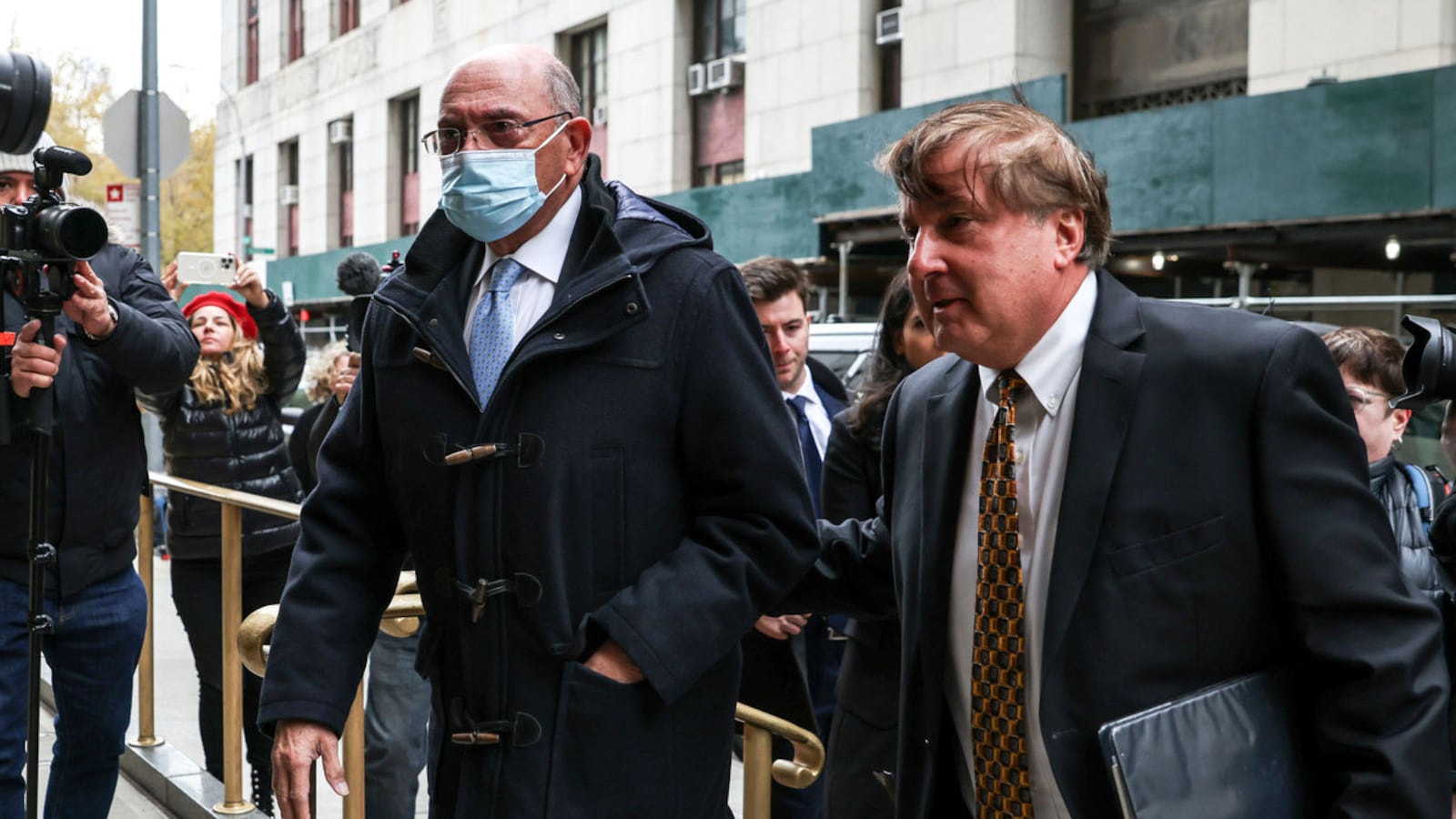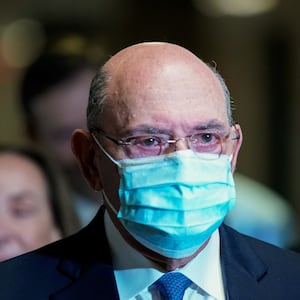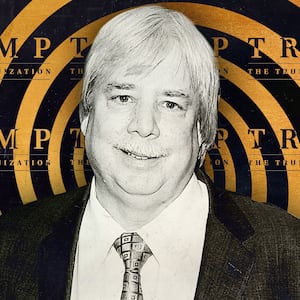In public, disgraced Trump Organization chief financial officer Allen Weisselberg lost his job after getting indicted for cheating on his taxes. But in private, Weissleberg kept doing the same work and retained his seven-figure salary.
Testifying under oath for the first time at the company’s criminal trial on Tuesday, Weisselberg shocked the courtroom by admitting that he’s essentially kept living life as normal after everything seemed to come crashing down last year.
Weisselberg, who served as Donald Trump’s right-hand finance guy since 1986, was unceremoniously stripped from all of the Trump Organization’s sprawling web of corporate entities in 2021. He was the first—and so far, the only—target of the Manhattan District Attorney’s investigation into tax dodging at the former president’s real estate empire. His situation seemed to get even worse when he pleaded guilty in August and agreed to help the DA’s office by testifying against what most people believed to be his former employer.
But while the American public was given the impression that the Trumps were distancing themselves from a corrupt finance officer, in reality, Weisselberg was as close as ever.
On the stand, Weisselberg testified that he still shows up to work in Midtown Manhattan, where he personally advises Eric Trump on prospective business deals, analyzes new mortgages, leases office spaces, and oversees company cash management.
He’s no longer CFO, but he earns the same $640,000 annual salary and gets the same $500,000 yearly bonus.
And he lit up on Tuesday, when he revealed that he fully expects to get his half-million dollar bonus this coming January.
"Hopefully," he said, cheerfully.
The arrangement calls into question whether Weisselberg will be helpful to the DA’s office, which is trying to use him as a star witness to nail the Trump Organization for running its operations like a lawless zoo—paying its executives with untaxed benefits and creating a no-show job for Weisselberg’s wife.
The only demotion Weisselberg appears to have actually suffered was literal, as he got bumped from Trump Tower’s executive offices on the 26th floor down to the boring 25th.
During the start of his testimony Tuesday afternoon, Weisselberg only briefly showed a realization of how bad this looks when he recalled what he did on Aug. 15. Hours after he met with prosecutors to finalize his plea agreement, he made his way to Trump Tower to have a birthday bash.
"My son wanted to make sure I had a birthday party… much to my regret,” he said.
After getting prodded by the prosecutor, he added, "it was a small cake. It was a cake. It was a small party, yes.”
The festivities cast further doubt on Weisselberg’s willingness to come clean about the way he toyed with the books at a firm that Trump famously ran until he was elected president in 2016. Manhattan District Attorney prosecutors are going after the Trump Organization for tax evasion, with prosecutors already exposing a number of ways in which Trump’s family business compensated executives off the books.
The ongoing trial threatening the company’s future has finally hit its stride on the very same day that Trump—who was twice impeached, engaged in a fraudulent campaign to remain in power, incited an attack on Congress, and is currently under several criminal investigations—formally declared that he is running for president again in 2024.
The day at the Manhattan criminal courthouse began with testimony from Trump Organization controller Jeffrey McConney, who continued to play dumb about the way he routinely helped fellow executives divert their salaries to avoid paying taxes. Although prosecutors spared him criminal charges on the condition that he testify against his current employer, McConney has spent more than a week putting that immunity deal at risk by frustrating the DA’s office with mumbling testimony.
At one point, assistant district attorney Joshua Steinglass just started ripping into McConney.
“You have a college degree in accounting, correct?” Steinglass asked. “You worked at an accounting firm for eight or nine years before you joined the Trump Organization, correct? You were in charge of payroll at a multi-billion dollar corporation for 30 years… you're a paid tax preparer. That requires at least some familiarity with the tax code, correct?"
And yet, McConney insisted he didn't know the company needed to report hundreds of thousands of dollars in untaxed corporate benefits.
Importantly, prosecutors began laying the groundwork for eventually arguing that Trump was clearly in on the rampant cooking of the company books, as jurors learned that the CEO would need to sign any company check over $2,500 up until the moment he turned over the reins of the firm upon entering the White House in 2017.
Later, jurors heard from an otherwise unassuming older woman with an affable personality: Trump Organization accounts payable supervisor Deborah Tarasoff.
Tarasoff seemed meek and lighthearted, joking that she couldn’t recognize the model numbers of—much less afford—Mercedes Benz sedans that were provided to Weisselberg, his wife, chief operating officer Matthew Calamari, or his wife. But that changed when she admitted to going back and deleting evidence of a crime after being instructed to by Weisselberg himself.
The prosecutor asked Tarasoff why a copy of the company’s ledger the DA’s office obtained via a subpoena was curiously missing the instruction “per Allen” next to a listed, untaxed company perk—a note that was still there in copies they received separately from the company’s outside accountants at Mazars USA.
"Somebody went in and deleted the name," she said.
"Who?" Steinglass asked.
"Me," she responded.
She went on to admit that she and McConney spent much of Sept. 26, 2016—just as Trump’s presidential campaign was in its final stretch—deleting a dozen such lines from the company's books.
When it was finally Weisselberg’s turn to testify, he was questioned by Susan Hoffinger, chief of the Manhattan DA's investigation division. She too began laying traps that could eventually point the finger at Trump.
“Who authorized executive compensation?” she asked him.
“Donald Trump,” he responded.
“Did you authorize compensation for Matthew Calamari?” she asked.
“No,” he responded.
“Jason Greenblatt?” Hoffinger asked, referring to the Trump Organization’s general counsel.
“No,” he repeated.
The stakes have been rising ever since Monday, when McConney testified that he didn’t know whether creating a fake job for Weisselberg’s wife, so that she could qualify for taxpayer benefits like Social Security, was legal.
“I knew it wasn’t correct,” McConney said. “Wasn’t sure it was illegal.”
The Trump Organization is on criminal trial for exactly these types of tax shenanigans. Prosecutors say executives were able to avoid taxes on compensation like luxury cars, private school tuition, and ritzy New York apartments.








